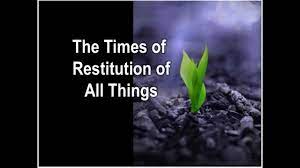The Restitution of All Things

ἀποκατάστασις
ἀποκατάστασις, -εως, ἡ, (ἀποκαθίστημι, which see), restoration: τῶν πάντων,
the restoration not only of the true theocracy
but also of that more perfect state of (even physical) things which existed before the fall, Acts 3:21;
cf. Meyer at the passage. (Often in Polybius, Diodorus, Plutarch, others.)
See also: The Palingenesis

It should be obvious that we live in a broken world.
Who among us is perect or free of flaws?
God is not into making repairs or temporary repairs!
Then He who sat on the throne said,
“Behold, I make all things new.”
And He said o me,
"Write, for these words are true and faithful.”
(Revelation 21:5)
 From Ray Stedman: "And now, brethren, I know that you acted in ignorance, as did also your rulers. But what God foretold by the mouth of all the prophets, that his Christ should suffer, he thus fulfilled. Repent therefore, and turn again, [literally] unto the blotting out of your sins, that times of refreshing may come from the presence of the Lord, and that he may send the Christ appointed for you, Jesus, whom heaven must receive until the time for establishing all that God spoke by the mouth of his holy prophets from of old." (Acts 3:17-21 RSV) Here Peter is declaring that God's answer to man's guilt, God's answer to man's condemnation of his Son and rejection of the Lord of life, is a forgiveness and a restoration which takes into account man's ignorant blindness. Peter is saying to these men, "As God sees what you did, he sees it not as the deliberate act of a perverted and twisted will trying to strike back against him; he sees it as the blundering act ignorant minds that did not realize what they were doing." I wonder if, in these words, we do not have an echo of Peter's memory of those words he heard from Jesus on the cross: "Father, forgive them, for they know not what they do..." (Luke 23:34). Perhaps nowhere else in Scripture do we see more clearly how God sees man. He sees him as ignorant, as blind and stupid, blundering along in his darkness, not knowing what he is doing. This is the problem today, is it not? Is this not what all the events of our time are bringing sharply to a focus in our lives -- that we do not know what we are doing in trying to run this world? We do not know what we are doing in trying to run our own lives. How many people have said to me, "Oh, I had no idea what I was doing! I look back now and all of a sudden I discover that all my sincere efforts to do what I thought to be right were wrong, and I've loused everything up!" Well, that is exactly what God expects of us. That is what he has been trying to tell us all along. You see, it is only man's pride that starts boasting about all his achievements while ignoring his weakness and his folly and his atrocious blunders that he makes in all areas of life. But God's grace is revealed by the fact that he is ready to write it off on that basis and say, "I know that you didn't mean to; you're just blind, stupid." Somebody passed along to me this week a very revealing clipping from Herb Caen's column in the San Francisco Chronicle, in which he is recounting the problems, the dilemmas, that this present generation faces. Among other things, he writes,
This is what Peter is saying. This is humanity -- ignorant, blind, stumbling along, patting itself on the back, priding itself on its achievement, and yet making the most atrocious blunders, all of which catch up with us sooner of later. Not only in the realm of politics and economics is this true, but even in the realm of ecology -- so that every time we flush the toilet something terrible happens to our ecology! "And yet," says Peter, "what God foretold by the mouth of all the prophets, that his Christ should suffer, he thus fulfilled." That is, by the means of human stupidity and ignorance, God's purposes were nevertheless worked out. That is grace, is it not -- that through all the blindness and the folly, the foolishness of human life, God is still working out his purposes? And now Peter goes on to announce what they are: "Repent therefore, and turn again, unto the blotting out of your sins" -- and two great things will happen: "times of refreshing will come from the face of the Father," and "he will ultimately send Jesus Christ unto you to restore all the things which were spoken by the mouth of God's holy prophets from of old." That is a remarkable statement. Peter is looking down the course of the whole age, and he says, "Here are the principles by which God is going to operate: Wherever there is a turning back to him, there is immediately a dealing with the problem of guilt. God blots out sins."  I do not know anything more difficult to get people to believe than that. It is amazing how many Christians have heard all their lives that God forgives their sins, blots out their sins, deals with this great problem of guilt which is at the root of all human ill -- and yet they still do not believe it! They are still trying in some way to work out some standing or merit before God, or to do something in themselves which will make themselves acceptable to him. But Peter says God arouses guilt only because he has the solution to it, and that is the blotting out of sins in the name of Jesus. Faith in the name of Jesus blots out your sins. "And from that," Peter says, "two things will happen: first, there will come times of refreshing," i.e., periods in human history which will be characterized by relative peace and prosperity, times of order and joy and happiness and relative contentment in society. We need only to look back through history to see how true this is: After the spiritual awakening of the Wesleys, England was saved from the disaster of revolution which the French had just gone through. The country was turned around, and there emerged a period of relative prosperity and joy and contentment. There were still many problems, granted, but it was a time of refreshing. And there have been other such times in history. The Protestant reformation in Germany under Martin Luther was such a time. And other times have been recorded. But these times of refreshing, seasons of refreshing, come only when a people turns to God and seeks the blotting out of sin. "Furthermore," says Peter, "it will result, ultimately, in the return of Jesus Christ." That is, only when God's people turn back to him, ultimately, is God going to return his Son again from heaven. That is very, very significant. It confirms what I have long suspected from the Scriptures -- that when Jesus Christ returns again, he is not coming back in a time of a low ebb of faith. He is not coming when faith is almost burned out and God's people are going through a time of barrenness, a spiritual desert. Rather, he is going to come back at the height of an awakening, a time when God's people have returned to him, and there has been a blotting out of sins, and there is a release of the fullness of the power of the Spirit. In the midst of that, Jesus Christ will return. The world around will be barren and disconsolate, despairing; but there will be a time of life and vitality on the part of the people of God. Peter closes with this appeal to act:
Paul tells us that, historically, the gospel was to go to the Jew first and then to the Gentile. And that is the program which is followed in the book of Acts. Soon it will turn to the Gentile world, for in Christ there is neither Jew nor Gentile; they all come on the same ground. But Peter's argument is, "Look, you are Jews. You know the prophets, you have been reading them. And your own Scriptures urge you to believe in Jesus." Peter brings it home with a personal emphasis: "God has sent him to you to turn you from your wickedness." I wonder if Peter did not learn all this knowledge of the Old Testament application to the Christian life from what Jesus taught him during those forty days after his resurrection, when he opened their minds to understand the Scriptures and, "beginning with Moses and all the prophets, he interpreted to them in all the Scriptures the things concerning himself..." (Luke 24:27 RSV). Peter is really recounting those words here. And he is saying, "The final issue is this, and each of you must settle it for himself: Will you allow God to turn you from your wickedness?" Will you begin at the place where God begins -- not out at the periphery of life, clearing up a few surface problems, but right at the heart, with your problem of guilt,with your lack of acceptance of yourself before God, with your sense of inadequacy and inferiority -- and deal with that before Jesus Christ and, in the name of Jesus, believe that God loves you and receives you and makes you his own, and you are privileged to live as his child, his son, in the midst of this present life? That is where Peter leaves the issue. Perhaps you would like to answer this question Peter leaves with us: What are you doing with Jesus? Will you allow God to turn you from your wickedness -- in the name of Jesus? (Ray Stedman, By Faith in His Name.) |

|
In this present series we have been looking at the great principles that govern human society, those principles which produce straining social problems, such as war, crime, poverty, unequal distribution of food, improper use of leisure, and urban blight. These all arise when men who are made in the image of God, but have lost the likeness of God, seek to fulfill the original command of God to master the earth and fill it, but without the Spirit of God within. As is so evident in our day, man succeeds only in darkening the skies, ravishing the ground, poisoning the water, setting men against each other in violence and cruelty, and in spreading death, fear, and hatred throughout the earth. But all this is done in the midst of increasing comfort and luxury and the technical brilliance that builds impressive cities and produces astonishing gadgets of incredible complexity and power. The seeds of all this are found in the first five chapters in Genesis, as we have been seeing. Now no house built upon such a shaky foundation can long stand, therefore the record of history has been the collapse of one civilization after another. Arnold Toynbee has indicated there have been in the past some twenty-one or more different civilizations, each one in turn collapsing and giving way to another. Therefore we should not be at all surprised to find here, in this definitive passage of Scripture, a description of the signs that accompany the imminent collapse of a civilization. Since many of us feel that we are living in such an hour today, it is easy to see how contemporary this is. The Bible, as you know, speaks of "times and seasons" in the affairs of men (Daniel 2:21, Acts 1:7, 1 Thessalonians 5:1). Times are those major divisions of history which are marked by a special character. The Bible speaks, for instance, of the "times of ignorance," (Acts 17:30) and by that it is referring to the ages before the coming of Christ, when men lived in relative ignorance of the understanding of God. It speaks again of the "times of the restitution of all things," (Acts 3:21 KJV) in the future when God would work out all his purposes and unite all things together in Christ. We use language somewhat similar. We speak of the Dark Ages, characterized by widespread ignorance and moral darkness. But seasons are those divisions of time in which certain events come to the fore. I do not think I can do better than to quote Archbishop Trench, from his Synonyms of the Old Testament, in this respect:
Remember that Jesus said to his disciples after his resurrection, "the times and seasons are not for you to know," (Acts 1:7). They will unfold as history goes on its way, but we cannot predict when they will occur in the span of time. It is very important that we recognize these divisions when they do occur, and especially to understand what our Lord meant when he said, "As it was in the days of Noah, so shall it be in the days of the coming of the Son of Man," (Matthew 24:37). Now we are studying the days of Noah. Our Lord linked these two epochs together and said that one is the parallel of the other. If we are living in the days immediately preceding the return of Jesus Christ we shall find similar conditions to the days of Noah. So in Genesis 6 we have the real story behind the headlines of history. Here we find three steps traced for us that mark the signs of the imminent collapse of civilization. The first one is given to us in Verses 1 through 4 and, as we shall see, it is that of a demonic invasion:
Interest immediately focuses on the question, Who were these sons of God? What kind of beings did these strange things? One suggestion that we must take note of is that here we have the blending of two lines; the line of Cain, and the line of Seth (which have been followed briefly in previous chapters); and that here is the intermarriage between these two lines, that of the godly (the line of Seth), and the ungodly (the line of Cain). But there are several severe objections to this idea. One, of course, is that this would make the line of Cain the "sons of God," and that hardly seems fitting in view of the character that is given to us in the Bible of Cain and his descendants. It seems much more likely that that description would be applied to the sons of Seth, rather than those of Cain. Then, too, it appears that the ungodly have only sons, while the godly have daughters.. Now that is a perfectly acceptable view as far as I am concerned, since I have four daughters. But it hardly seems possible to accept such a view. It is all too clear that this theory does not take account of all the factors evidenced. There is an alternative view that takes note of the fact that in Scripture it is only by a specific divine act of creation that any being can be termed a son of God. God is a Spirit, and man is flesh, and in the New Testament we are told that "that which is born of the flesh is flesh, but that which is born of the Spirit is spirit," (John 3:6 RSV). So you cannot have men of the flesh termed sons of God, except a divine creative act be performed. In the New Testament, Adam is called a son of God because he is the direct result of divine creation, Jesus Christ is called the Son of God because he is eternally begotten of the Father; and believers are called sons of God because they are born again by faith in Jesus Christ, in a divine creative act. Also, in the Bible, angels are called sons of God for they came directly from the creating hand of God and are not reproduced sexually, as men are. It is interesting that in the Old Testament every other use of this term sons of God refers to the angels. You will find in the book of Job that the angels are called sons of God (Job 1:6, 2:1, 38:7). Now we learn from Jude and Peter in the New Testament that there was a fall of angels, and the time of that fall is given as "the days of Noah." There are two very interesting passages that link up with Genesis 6. In First Peter, Chapter 3, we have a passage that has been a puzzle to many but which does directly apply to this account: Peter says of Jesus that he went "in the spirit" and preached to "the spirits in prison," (1 Peter 3:19). Now, there has been much controversy as to what this meant. Some have thought it meant that Jesus descended into hell and preached to the spirits in hell during the three days between his crucifixion and resurrection. Personally, I do not ascribe to that theory at all. I think it means that it was through the Spirit that Jesus preached in the days of Noah, speaking in the person of Noah. Noah, we are told, was "a preacher of righteousness" (2 Peter 2:5), and the Spirit of Christ preached through him. But, at any rate, that is somewhat beside the point. The passage goes on to say that these were spirits in prison,
Also in Second Peter, Chapter 2, Verse 4, Peter recounts a fall of the angels:
Note that he links this fall with the days of Noah. Then in the book of Jude we have another reference to this event:
There Jude gives us the nature of the sin of the angels. He said it was like that in Sodom and Gomorrah; it was "unnatural lust." This you can see is directly in parallel with the statement in Genesis 6, that the "sons of God" came in to "the daughters of men" and married them, taking wives as they chose. This is evidently regarded in the Scriptures as an unnatural act. Thus we have the picture of fallen angels joining in sexual intercourse with the daughters of men and producing a strange race. There have been those who object to this idea by pointing out that Jesus said that angels are sexless. In Matthew 22, Verse 30, he does say that those who are in the resurrection "will neither marry nor be given in marriage, but are like the angels in heaven." It must be noted, however, that he adds the words, "in heaven," as opposed to the angels in hell. Some have suggested that perhaps there was a time when angels did have sexual powers, and this, of course, would permit the kind of thing recorded here. However, it seems more likely that the explanation is given to us by Jude when he says of these angels that they "left their proper dwelling" (Jude 1:6), and presumably took up improper dwelling places. Now bodies, in Scripture, are called dwelling places. The very term Jude uses is, elsewhere in Scripture, applied to the body. Its use here implies that the angels took up residence where they did not belong. This, therefore, is suggestive of what we have in the New Testament in the days of our Lord, in the many, many cases of demonic possession recorded so frequently in the pages of the gospels. Evil spirits, fallen angels, possessed the bodies of men, and these demon-possessed men married women and produced a race of strange beings called here in Genesis 6, "the Nephilim." They were a race of giants. The word Nephilim is confirming of this whole idea, because it means "the fallen ones." All this strongly suggests that demonic possession has the ability to affect genetic structure. The chromosomes are changed so that the progeny are markedly different; a sort of mutation takes place, and the result is a pronounced change in the children of such a union. We know today that LSD has this kind of an effect upon the genetic structure. Chromosomal changes take place and children can be malformed and mentally deficient because of the use of LSD by their parents. It is interesting that, in the book of Revelation, the Bible links drugs with demonism and suggests that drugs are a means by which the human spirit is opened up to the control of demonic beings. Time Magazine reported a new theory to the effect that "a genetic abnormality may predispose a man to antisocial behavior, including crimes of violence..." A normal male baby has an XY chromosome pattern, but occasionally one is found with an XYY pattern. According to an all-woman team of researchers in Scotland, this "may be a supermale, over aggressive and potentially criminal." It was further noted that "the XYY (males) averaged 6 ft 1 inch tall whereas the average for (others tested) was 5 ft 7 inches." It is clear that the result of this union of demon-possessed men with women was a race of mighty men, "men of renown." Here, I think, is the explanation for the stories of mythology with which many of you are familiar, the demi-gods -- half man and half god -- such as Hercules, and others. Mythology is no mere invention of the mind of man; it grows out of the traditions, memories, and legends which were a corruption and perversion of primitive truths. We are told in this passage that this occurred "also afterward." This "also afterward" means that after the Flood a similar incursion of demonic beings took place. This second invasion resulted in the presence in the land of Canaan of certain gigantic races which are called in our Bible, the Canaanites. Many of you who have stumbled over those long lists of "ites" in the Old Testament are familiar with these various races -- the Jebusites, the Geshurites, the Hittites, etc. All of these are divisions of the Nephilim (they are also called the Rephaim in the Old Testament) who were already in the land when Abraham came to the promised land. They represent an attempt on the part of demonic powers to derail the divine program of bringing a Redeemer into the world through the human race. It is interesting that archaeologists have now discovered the giant-cities of Bashan, and they confirm the fact that there did exist in this area races of gigantic beings whose beds are ten, eleven, or twelve feet long. (They had king-size beds in those days, but only because they needed them.) It was these people that the Israelites were commanded to exterminate completely. It was these giant cities they were to wipe off the face of the earth; to exterminate the whole populace and their animals. When this invasion of demonic powers into mankind takes place, notice that God, in his governing grace, immediately limits it:
That is sometimes regarded as a reference to the length of life of man before the Flood, but in this context I think it is clear that it means, rather, the number of years before the Flood, the length of time in which God would permit this kind of thing to go on in human society. The one thing the Bible makes clear everywhere is that God controls human society; he restrains demonic forces and only permits them to operate to a limited degree and for a limited period of time. Here we have clearly suggested the idea that he marked off before the Flood a hundred and twenty years, which would be the time when Noah would be permitted to preach the grace of God and extend an invitation to the people of his day to turn from their wicked ways and revive the promise of salvation. This First Peter confirms. Noah was indeed a preacher of godliness, of righteousness, and the people refused to hear his word during the one hundred and twenty years of the preaching of grace. Dr. Charles Malik, who was for a long time President of the United Nations and delegate from Lebanon, once said,
There is a word from a world statesman confirming the fact that demonic forces are at work in human society. The first mark of an imminent collapse of civilization is this appearance of demonic powers at loose. They manifest themselves primarily in open and unchecked wickedness. We shall see that this is the second mark given to us in the first part of Verse 5:
Unusually intense (that is the meaning of "great") and very widespread (in the earth) wickedness -- that is the second mark. The whole of the world of that day was involved in this. This wickedness is described in detail in various portions of Scripture. Wickedness is always the absence of the life of God at work in human society. It is always opposed to the things of God. Perhaps the most vivid, most accurate and detailed description of wickedness given to us in the New Testament is in the book of Galatians, where the apostle describes the works of the flesh. It is the flesh that is "enmity against God" and produces wickedness. He says,
That is wickedness. It is very noteworthy that in every listing of wickedness you will find, first, sexual wickedness. In the gospels it was "unclean" spirits that were possessing the bodies of men. This word unclean is used elsewhere in the New Testament as the word for lust, therefore these were lustful spirits, i.e., sexually twisted and distorted spirits. Their presence in society is always marked by outbreaks of sexual perversity. This is what Paul describes in Romans 1, where he is tracing the decline and fall of a society. He gives there, as the ultimate sign of imminent collapse, the turning of men to unnatural lusts with other men, and women to unnatural lusts with other women, and the breakdown of society at this sexual level. Thus we have clearly, as the second mark, a widespread and unusual manifestations of sexual wickedness; not sporadic, but continuous; not localized, but everywhere. Naturally there have been occurrences of this sort in every civilization at some time. But here, it has a double character; it becomes a continuous thing and is everywhere taking place. Now in the second half of that same verse we have the third mark of the imminent collapse of civilization. It is what Moses calls here, evil (debased) imaginations.
The outward wickedness rested upon a deeper corruption within. The "imaginations of the heart" are the desires and urges for ever more stimulating experiences, what Paul calls in Ephesians "deceitful lusts," which constantly urge men and women, boys and girls, to try to find something more exciting; what in modern parlance we call kicks, something that satisfies and is exciting. Now this urge for kicks constitutes debased imaginations. They would find expression in any society in the creative arts, those which depend upon imagination for their motivation and expression, such as literature, art, and drama. It is most significant that more and more today we are finding this area given over to the expression of the salacious, the lewd, and the sensual. Recently I heard of a teacher in public school who refused to teach literature anymore because of the salacious content of what he had to teach. He simply gave up his training and professional background in order to avoid having to teach this kind of stuff. All of this is summed up for us in two words in Verse 11:
Corruption is inward pollution, the polluting of the mind, the heart, the imagination, the inner nature. The inner kingdom becomes extremely sensual and is polluted. The result is outward violence, destructiveness, the outbreak of cruelty and violence on every side. There you have the marks of an impending collapse of civilization. Rather sobering, isn't it? When civilization reaches this stage then the Bible clearly implies that judgment is certain, by divine fiat. We read on in Verse 6:
When the account says, "God is sorry," it is really the word, "God repented." We know from other Scriptures that it is impossible for God to repent. He does not change his mind like man does. But this is a powerful figure to express in a vivid way the anger and determination of God. When society reaches this stage of dissolution and deterioration, God's anger burns. It appears that he has changed his mind completely even though he is but acting on principles that are entirely consistent with his own being. Yet, in the midst of this, we read that it grieved him, and grief is always the activity of love. What we finite human beings do not understand is that God's love and wrath are exactly the same thing. They are two sides of the same coin. What entrances us and warms us about God, and draws us to him, is love, the manifestation of his total being. He is the God of love, who loves regardless of merit. This is what attracts us. But it is because we respond that he appears to us in that way. To those who reject his love, the same quality in God becomes wrath and it seems to be a wall of fire, burning and consuming everything. We can see this also in ourselves. It is our love that causes us to be angry at anything which injures what we love. You injure a mother's child in the mother's presence and watch her love flame out in wrath and anger against you. Thus we have here clearly described a time when man, in his rejection of God, passes beyond the place of seeing God as love, and begins to experience his love as wrath. But it is exactly the same thing. With mankind goes the whole creation because the creation is linked with man. The animals were made for man, so when man goes, the animals must go as well. But always there is the shining of grace, Verse 8:
God was calling throughout this whole age, just as he is calling in our age today, pleading with men to turn from their ways, to resist the widespread lie of Satan. One man and his family turned and found grace in God's sight. He did not deserve it, and he could equally have turned and gone the other way, but he responded to the wooing and pleading of God and found grace in his sight. That same grace is why we are here this morning. Bring this down to this 20th-century hour, and draw the parallel between the days of Noah and the days in which we live. You can see it plainly everywhere. We must remember that if we are delivered from the wrath to come, if we escape the judging hand of God upon society, it is not because of anything we have done; it is the manifestation of God's grace. Remember the Christian who saw a drunkard staggering down the street wallowing in his own vomit, and turned to his friend to say, "There but for the grace of God go I." We can all say that. What has kept us? What has brought us to the truth? Was it any goodness on our part? No, it is God's grace. It is that he loved us and called us, he wooed us and won us, seeking us out and, through many influences upon us, bringing us at last to see that the age in which we live is an age under the bondage of a lie. He has opened our eyes, partially at least, to the truth, till we have turned to the Lord Jesus and rested under the grace of God. As our age deteriorates, as other ages have done before us, and our civilization nears the point of utter collapse, we can thank God that we have been snatched away as brands from the burning, like Noah and his family, if our hearts are responsive to the appeal of God's grace. PrayerOur Father we thank you for this honest, searching look at our world today. How easily we see how true it is that the statement of Jesus is, that as it was in the days of Noah, so shall it be in the coming days of man. We believe that we can recognize here the signs that confirm the near coming of our Lord Jesus Christ, and the imminent collapse of what we call civilization in this 20th century hour. Grant to us that we may live as those that see the Light and not as men in the dark. We no longer give ourselves to short sighted programs in the seeking of pleasure and luxuries for ourselves. Grant that we may be available instruments of your grace in an hour sitting under judgement of your hand. We ask you in Jesus name, amen. Signs of Collapse MAY 05, 1968
AUTHOR: RAY C. STEDMAN
|
Resources
The Palingenesis







